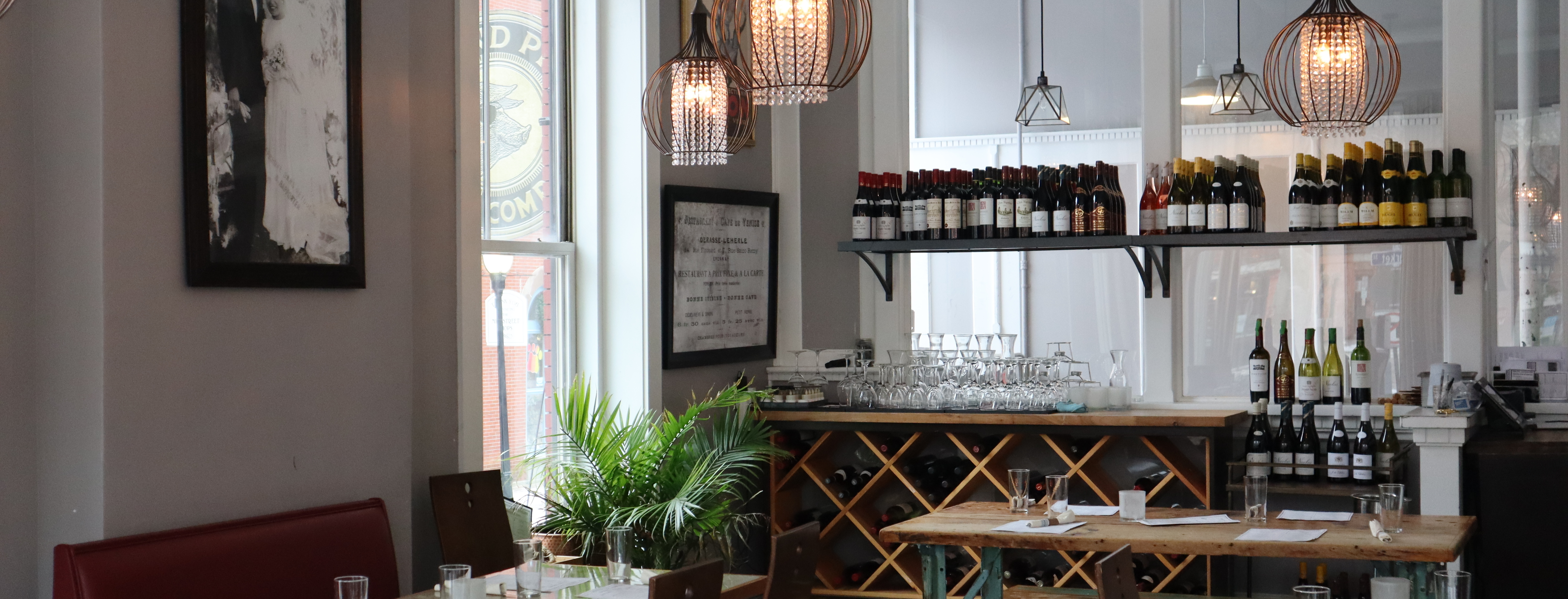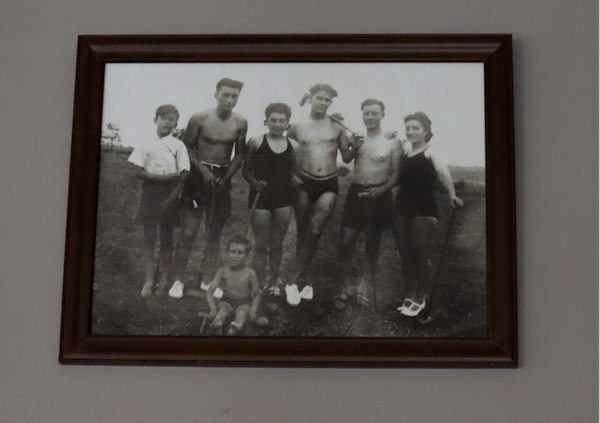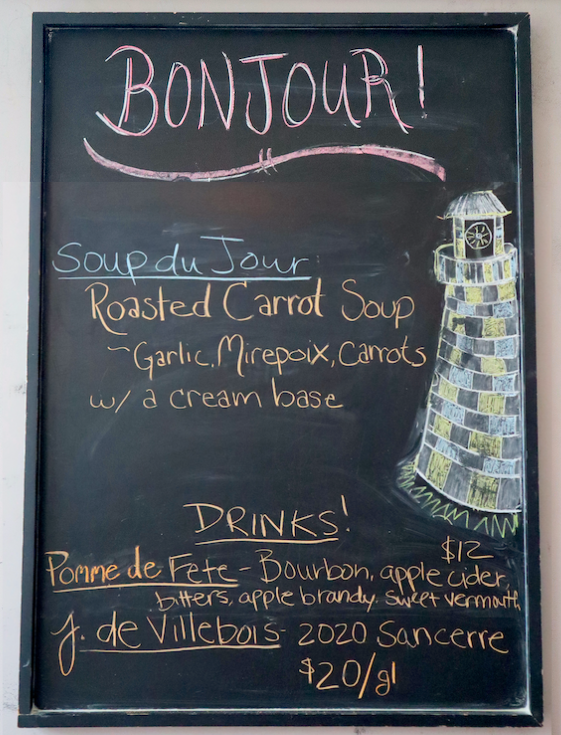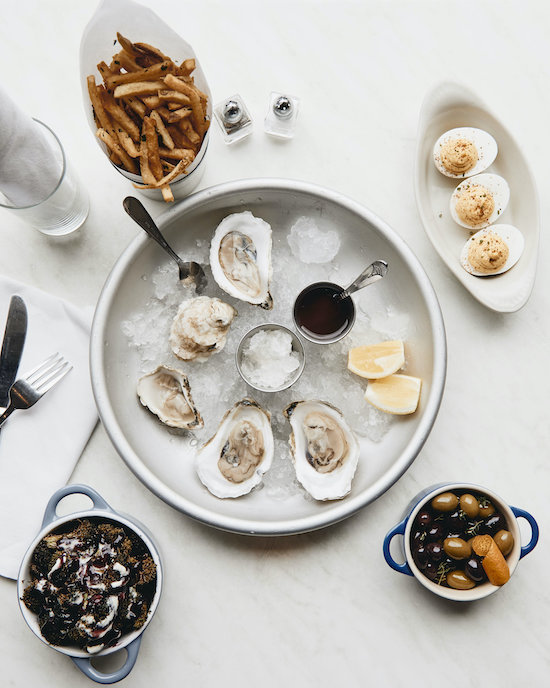
Petite Jacqueline opened in Portland’s West End in 2011, and moved to its new location on Market Street in 2015. Owners Michelle and Steve Corry named the restaurant in honor of Michelle’s grandmother, Jacqueline. Born and raised in Andresy, just outside of Paris, Jacqueline was an enthusiastic and passionate cook. Her zest for life and love of hospitality lives on in her name-sake restaurant. Surfrider interviewed Michelle about the restaurant’s participation in the Ocean Friendly Restaurants program.
Q: What inspired you to open your restaurant?
Michelle: My husband and I opened our first restaurant, Five Fifty Five, in 2003. We had talked for a long time about Portland not having a French bistro, and we felt like that was a big hole in the dining scene. My husband was very close to my grandmother as well, and he used to cook with her, so we thought it would be perfect to open a French bistro so we could celebrate her and the culture. We moved locations in 2015, and we practically built the restaurant from scratch. My grandmother loved food, and she loved cooking. I grew up in a very French household, and the culture of eating with friends and family was a big part of our lives.

Q: What sustainability efforts do you have in place and what motivated you to undertake them?
Michelle: I have kids, so part of the motivation is that there’s still a planet left for them to enjoy. I think when you live in Maine you get a better appreciation of how important and what a big part of our lives the outdoors are. We live on the water, I surf, my kids surf, we ski, we try to embrace the outdoors, and we understand that it’s a two-way street. It’s really important to me to lead by example. In the early days we were working a hundred hours a week, so we didn’t have time to focus on anything but the business, but now we have time to start thinking about how we can give back to the community, and to the environment, and I really want to pass that on to my staff as well.
Q: How did you join the Ocean Friendly Restaurants program?
Michelle: I heard about the OFR program through Chez Rosa, in Kennebunkport. The owners used to work for us and were talking about your program. Kyle was our head chef and Yazmin was our pastry chef, and then our general manager. We’re very close, and we’re very supportive of them opening their own bistro. They’re both surfers, and they started talking about the program, and I said that’s something I’d like to do. We could basically tick all the boxes already, so it was a no-brainer. I would love to have this partnership push me, my staff, and my customers to engage with their community and environmental issues.
Q: Tell us about your special Ocean Friendly Restaurants drink.
Michelle: We are going to start doing a drink on the menu where we give $1 to an organization each time it’s ordered. We’ve done this for GMRI in the past, and we’re going to choose a different cause every month. It will be on the menu starting next week, and the proceeds will go to Ocean Friendly Restaurants.

Q: How has COVID-19 impacted your business and your ocean-friendly practices?
Michelle: Overall, it was a disaster. We had to close, and lay off everybody, which was close to fifty employees, which was horrible, and dealing with all the different mandates and keeping everyone safe but still operating the business. It’s been tough. But my staff’s been really good. As far as sustainability, I don’t think it’s affected too much. We’re doing more takeout, so we had a big discussion about making sure our containers were sustainable. We had a big discussion about straws two years ago. A lot of the decisions I make are done with my staff, so it’s not just from me. I really need to understand, if I just make a rule like no more straws, is that going to make your job harder, is that going to make customers unhappy? I need to hear it from them. But they were all on board with that. And then they come up with great ideas. Another example is composting, and how that will affect my kitchen. Does that make your life a billion times harder? Do we have the room for the barrels? Do we have a place to put it outside? Do we have a company that will take it? We try to make many of the decisions together. They’re very forward-thinking young people, so generally we’re on the same page when it comes to sustainability, and they’re excited about it, but I want to make sure they’re a part of that decision.
Q: What is your collaboration with the Gulf of Maine Research Institute?
Michelle: The Gulf of Maine Research Institute has done a really good job of going out and working with restaurants. They’re asking, ‘how can we make this work for restaurants, how can we make this work for fishermen, how can we make this work for consumers?’ We understand that fishermen have to make a living, and we understand that restaurants have to make a living, and that consumers have to be happy. They’ve done a lot of programs in the past where we’ve collaborated on using underutilized seafood. It’s the underutilized part that’s tricky. We’ve all tried really hard to get the customers to be interested in dogfish, or mullet, or different fish that there’s plenty of. But you need a demand from the customers, so that the restaurant will want to buy it, so that the fishermen will want to fish for it. It’s complicated. GMRI used to do this really cool restaurant week for underutilized seafood. They also do a lot of trainings where you can bring your staff and they’ll teach you about underutilized and byproduct species. Their approach is very balanced. They’re trying to get the fishermen and the restaurants on the same page, so we can make a bigger impact. Jen Levin from GMRI also started Gulf of Maine Sashimi, which is now True Fin.

Q: Do you have any advice for restaurants looking to make more sustainable choices?
Michelle: Get your staff on board. If you find one person who is passionate about it, you’ll be surprised by how much they will help you make it work. I would also say to look around; your staff might be doing more than you realized. For example, my to-go containers were already compostable, and my kitchen was really the ones who drove our composting program. And I think little things mean a lot. It’s a start. It doesn’t have to be everything all at once. Do what you can, because you are a business, and that is really important for folks to understand. I guess my other suggestion would be to reach out to organizations like Surfrider and tell them what your limitations are, so that maybe they can help find a solution.
Q: What are you looking forward to in 2022?
Michelle: Some normalcy, traveling. I want my kids to have a normal existence. For the restaurant, we’re already seeing a downturn in numbers, people are not going out again because they’re worried. I’d just like to get back to normal and run a business and deal with those challenges, which are quite enough.
Is your local restaurant Ocean Friendly? If not, encourage them to sign up and join the movement to end single-use plastics!
